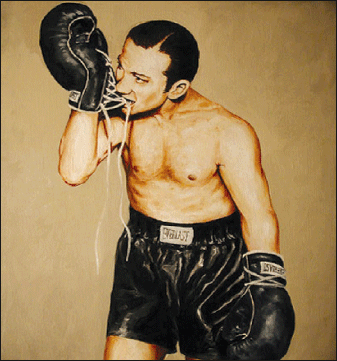 ST. JOHN BARNED-SMITH: The compact biography deftly recreates the scenes of Barney Ross’s life, of a striver “intoxicated by the clouds of cigar smoke hovering over the men in fedoras; the fists mummified in billiard cloth and tape; the mineral jelly smeared on gashed eyebrows; the tattoo of leather on leather….” Century moves from Ross’s early years in Chicago to his place in the history of Jewish prizefighting. More interesting to me, though, was the author’s ability to convey a life defined by strife, one that seemed to embody that of a generation. From the very beginning, “Life was a never-ending battle for Barney Ross,” Century writes in his introduction. It’s a wonder he became a boxer at all: Ross’s father told him: “The religious man prizes learning above everything else. Let the atheists be the fighters, the trumbeniks, the murders – we are the scholars.” In short order, we learn of the young man’s upbringing in an Orthodox family, victims of pogroms in Best-Litovsk who loathed violence in any form. Yet Ross slogs from one bout to the next: Here, Ross loses his father, murdered by two thieves robbing the family grocery; here he brawls in matches to raise money to get his siblings out of an orphanage; and here he affirms his identity as a Jewish boxer. Ross fought to the top of the boxing world — as the undisputed champion of the lightweight, junior welterweight and welterweight divisions — and battled fiercely for his faith. He wore a blue and white terrycloth robe, tzitzis and phylacteries, and refused to fight on his Sabbath. In the shadow of pogroms and European anti-Semitism, Century writes, “Barney boxed with a passion he had never felt before, hit the sandbag until it practically groaned, and said that the news from Germany filled him with a new sort of resolve that made him feel like ‘I was fighting for my people.’” The struggle for respect was one of fists and blood, and in three epic matches in one year he took on (and defeated) Jimmy McLarnin, known as the “Jew Beater.” MORE
ST. JOHN BARNED-SMITH: The compact biography deftly recreates the scenes of Barney Ross’s life, of a striver “intoxicated by the clouds of cigar smoke hovering over the men in fedoras; the fists mummified in billiard cloth and tape; the mineral jelly smeared on gashed eyebrows; the tattoo of leather on leather….” Century moves from Ross’s early years in Chicago to his place in the history of Jewish prizefighting. More interesting to me, though, was the author’s ability to convey a life defined by strife, one that seemed to embody that of a generation. From the very beginning, “Life was a never-ending battle for Barney Ross,” Century writes in his introduction. It’s a wonder he became a boxer at all: Ross’s father told him: “The religious man prizes learning above everything else. Let the atheists be the fighters, the trumbeniks, the murders – we are the scholars.” In short order, we learn of the young man’s upbringing in an Orthodox family, victims of pogroms in Best-Litovsk who loathed violence in any form. Yet Ross slogs from one bout to the next: Here, Ross loses his father, murdered by two thieves robbing the family grocery; here he brawls in matches to raise money to get his siblings out of an orphanage; and here he affirms his identity as a Jewish boxer. Ross fought to the top of the boxing world — as the undisputed champion of the lightweight, junior welterweight and welterweight divisions — and battled fiercely for his faith. He wore a blue and white terrycloth robe, tzitzis and phylacteries, and refused to fight on his Sabbath. In the shadow of pogroms and European anti-Semitism, Century writes, “Barney boxed with a passion he had never felt before, hit the sandbag until it practically groaned, and said that the news from Germany filled him with a new sort of resolve that made him feel like ‘I was fighting for my people.’” The struggle for respect was one of fists and blood, and in three epic matches in one year he took on (and defeated) Jimmy McLarnin, known as the “Jew Beater.” MORE
Curated News, Culture And Commentary. Plus, the Usual Sex, Drugs and Rock n' Roll
